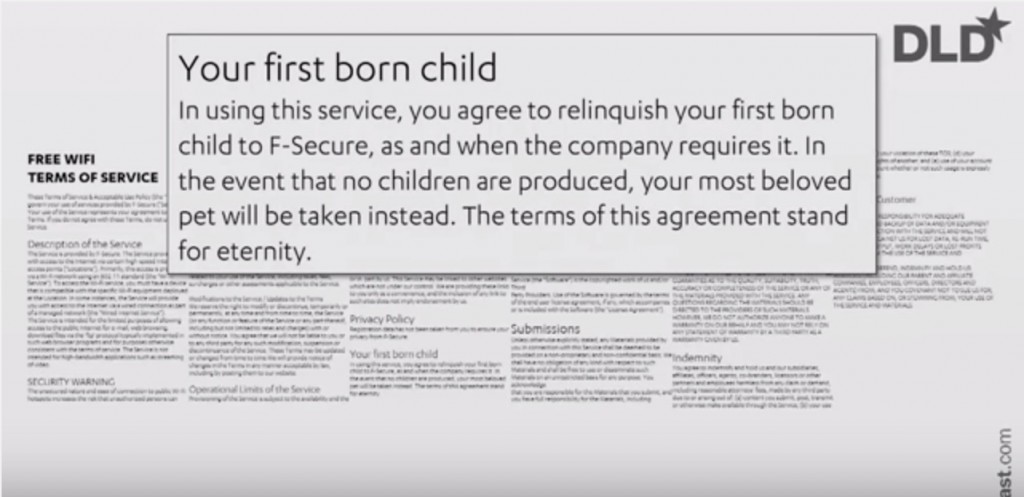Difference between revisions of "Notepad:Simulacra"
| Line 31: | Line 31: | ||
| + | [http://graphics.wsj.com/blue-feed-red-feed/ Blue Feed, Red Feed] - Liberal Facebook and Conservative Facebook, Side by Side | ||
| + | |||
| + | Algorithms – [http://www.theatlantic.com/technology/archive/2015/01/the-cathedral-of-computation/384300/ The Cathedral of Computation] | ||
| + | :: ''Here’s an exercise: The next time you hear someone talking about algorithms, replace the term with “God” and ask yourself if the meaning changes. Our supposedly algorithmic culture is not a material phenomenon so much as a devotional one, a supplication made to the computers people have allowed to replace gods in their minds, even as they simultaneously claim that science has made us impervious to religion.'' | ||
| + | |||
| + | [http://www.thenation.com/article/how-companies-turn-your-facebook-activity-credit-score/ How Companies Turn Your Facebook Activity Into a Credit Score] | ||
| + | :: ''Thousands of data brokers keep tabs on everything from social-media profiles and online searches to public records and retail loyalty cards; they likely know things including (but not limited to) your age, race, gender, and income; who your friends are; whether you’re ill, looking for a job, getting married, having a baby, or trying to buy a home. Today, we all swim in murky waters in which we’re constantly tracked, analyzed, and scored, without knowing what information is being collected about us, how it’s being weighted, or why it matters—much of it as irrelevant and inaccurate as the hearsay assembled during the early days of consumer reporting.'' | ||
| + | |||
| + | [http://tressiemc.com/2015/05/30/credit-scores-life-chances-and-algorithms/ Credit Scores, Life Chances, and Algorithms] | ||
| + | :: ''It is the [http://academic.udayton.edu/RichardGhere/POL%20307/weber.htm iron cage] in binary code. Not only is our social life rationalized in ways even Weber could not have imagined but it is also coded into systems in ways difficult to resist, legislate or exert political power.'' | ||
| Line 40: | Line 50: | ||
:: ''Tasks that would seem to require a distinctively human capacity for nuance are increasingly assigned to algorithms, like the ones currently being introduced to grade essays on college exams. Particularly terrifying to me, computer programs can now write clear, publishable articles, and, as Ford reports, Wired magazine quotes an expert’s prediction that within about a decade 90 percent of news articles will be computer-generated.'' | :: ''Tasks that would seem to require a distinctively human capacity for nuance are increasingly assigned to algorithms, like the ones currently being introduced to grade essays on college exams. Particularly terrifying to me, computer programs can now write clear, publishable articles, and, as Ford reports, Wired magazine quotes an expert’s prediction that within about a decade 90 percent of news articles will be computer-generated.'' | ||
| + | |||
| + | [http://www.cbc.ca/news/technology/robot-ta-ai-1.3585801 University students fooled by robot TA] | ||
| + | |||
| + | |||
http://reclaim.trubox.ca/wp-content/uploads/sites/65/2015/03/Construction_drone_2x519.gif | http://reclaim.trubox.ca/wp-content/uploads/sites/65/2015/03/Construction_drone_2x519.gif | ||
Revision as of 19:37, 13 March 2017
- Representation starts from the principle that the sign and the real are equivalent (even if this equivalence is Utopian, it is a fundamental axiom). Conversely, simulation starts from the Utopia of this principle of equivalence, from the radical negation of the sign as value, from the sign as reversion and death sentence of every reference. Whereas representation tries to absorb simulation by interpreting it as false representation, simulation envelops the whole edifice of representation as itself a simulacrum. -- Jean Baudrillard, Simulacra and Simulation
Absorbed by unreality
Living in an Unreal World A Film By Adam Curtis. Excerpt from Hypernormalisation (review)
What are signs of the unreality that we are seeing today?
- Take a minute to think of one or two examples. After a minute, you will be paired with a classmate. Each take 2-3 minutes to ask the other partner about their example. Then, join with another pair, and explain your partner's example to the group.
Deceptive signs, ominous portents
The online world has always had its creepy elements. Abuse and misogyny. Catfishing. A bad joke can ruin a life.
We are learning to be mindful of our Digital Tattoo, learning bits of "catfish literacy". But does the challenge go deeper?
Black boxes
FIPPA • privacy • corporate co-option • net neutrality • DRM • risk • patent system • security • trolls • openwashing • CISPA • spying • fraud • tracking • hacking • apathy • CALEA • data snooping • LMS/VLE-ification • mass surveillance • Facebook • phishing • spamming • NSA • Gamergate • PRISM • student data is the new oil • vendor lock-in
Terms of use:

Terms of Service, Didn’t Read – Integrates legally-informed ratings with a browser extension.
Filter bubbles - http://graphics.wsj.com/blue-feed-red-feed/
The Macedonian Teens Who Mastered Fake News
- the Macedonian town of 55,000 was the registered home of at least 100 pro-Trump websites, many of them filled with sensationalist, utterly fake news. (The imminent criminal indictment of Hillary Clinton was a popular theme; another was the pope’s approval of Trump.) The sites’ ample traffic was rewarded handsomely by automated advertising engines, like Google’s AdSense.
Blue Feed, Red Feed - Liberal Facebook and Conservative Facebook, Side by Side
Algorithms – The Cathedral of Computation
- Here’s an exercise: The next time you hear someone talking about algorithms, replace the term with “God” and ask yourself if the meaning changes. Our supposedly algorithmic culture is not a material phenomenon so much as a devotional one, a supplication made to the computers people have allowed to replace gods in their minds, even as they simultaneously claim that science has made us impervious to religion.
How Companies Turn Your Facebook Activity Into a Credit Score
- Thousands of data brokers keep tabs on everything from social-media profiles and online searches to public records and retail loyalty cards; they likely know things including (but not limited to) your age, race, gender, and income; who your friends are; whether you’re ill, looking for a job, getting married, having a baby, or trying to buy a home. Today, we all swim in murky waters in which we’re constantly tracked, analyzed, and scored, without knowing what information is being collected about us, how it’s being weighted, or why it matters—much of it as irrelevant and inaccurate as the hearsay assembled during the early days of consumer reporting.
Credit Scores, Life Chances, and Algorithms
- It is the iron cage in binary code. Not only is our social life rationalized in ways even Weber could not have imagined but it is also coded into systems in ways difficult to resist, legislate or exert political power.
The robots: http://www.nytimes.com/2015/05/17/books/review/rise-of-the-robots-and-shadow-work.html?smid=tw-share&_r=0
- Tasks that would seem to require a distinctively human capacity for nuance are increasingly assigned to algorithms, like the ones currently being introduced to grade essays on college exams. Particularly terrifying to me, computer programs can now write clear, publishable articles, and, as Ford reports, Wired magazine quotes an expert’s prediction that within about a decade 90 percent of news articles will be computer-generated.
University students fooled by robot TA

We are the robots: Workplace monitoring – The Spy Who Fired Me
- Pearson described the Work Diary as “the equivalent of being able to walk up to someone’s desk and see how they’re doing.” But it is much more than that. Once every ten minutes while you’re logged in, the program takes a snapshot of your computer’s desktop. It’s a detailed image that shows, for example, all the tabs open on your Web browser. The program also records minute-by-minute keystroke and mouse data, along with a productivity rating. The exact timing of the snapshot is unpredictable. It could happen at the moment you open iTunes to start a new playlist. Or when your boyfriend sends you an instant message. An icon pops up on your screen whenever a screenshot is captured, and you can review them and delete any troubling images. “The application is not a surveillance system,” oDesk’s online Help Center says. “You have full control over what it records . . . deleting those [screenshots] you choose not to share with your client.” But the Help Center fails to note that for each screenshot you delete, you sacrifice ten minutes of guaranteed pay.